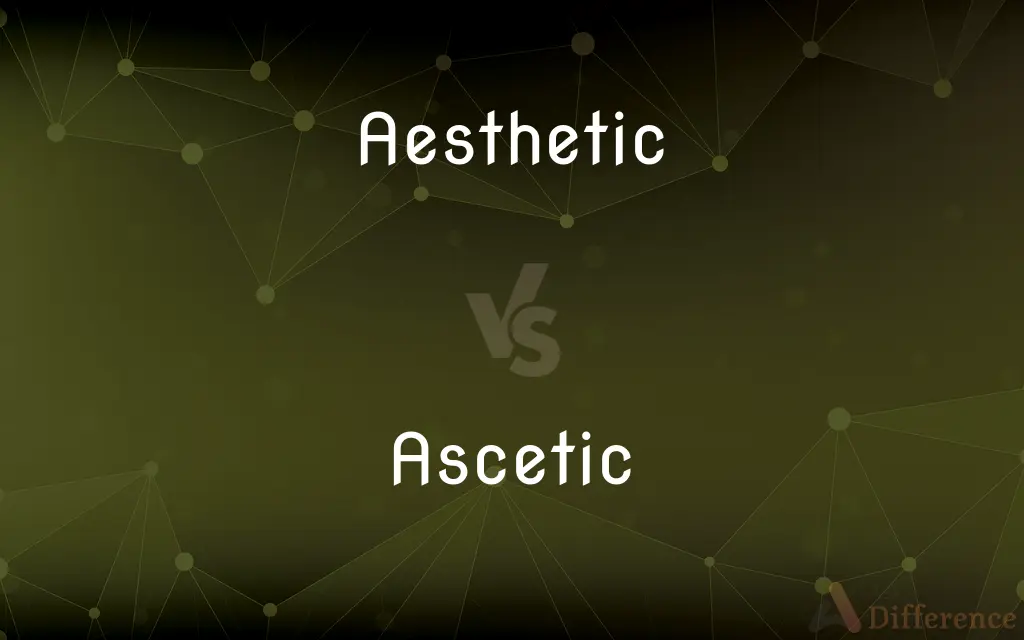Aesthetic vs. Ascetic — What's the Difference?
By Fiza Rafique & Maham Liaqat — Updated on April 27, 2024
Aesthetic relates to beauty and the appreciation of art, focusing on sensory perceptions, while ascetic refers to a lifestyle characterized by self-discipline and abstention from indulgence.

Difference Between Aesthetic and Ascetic
Table of Contents
ADVERTISEMENT
Key Differences
Aesthetic pertains to the nature of beauty, art, and taste, and the creation and appreciation of beauty, often influencing fashion, design, and culture. On the other hand, asceticism is a lifestyle embraced primarily in religious contexts, emphasizing simplicity and self-denial to achieve spiritual goals.
The aesthetic value of an object or experience is determined by its visual, auditory, and emotional impact, enhancing everyday life through design and art. In contrast, ascetic practices involve minimizing physical pleasures and worldly attachments, focusing on spiritual rather than materialistic growth.
People who pursue aesthetic values often engage in enhancing their environments or experiences to appeal to the senses, such as decorating homes or enjoying fine arts. Whereas, ascetics might live with minimal possessions and practice routines that promote self-discipline, such as fasting or meditative retreats.
In modern society, aesthetic considerations can drive consumer behavior, influencing choices in what people buy and consume based on visual appeal and artistic merit. Conversely, ascetic values can lead to a rejection of consumer culture, prioritizing personal and spiritual enrichment over material success.
Historically, aesthetic principles have shaped artistic movements and philosophies, reflecting societal values about beauty and artistic expression. Ascetic practices, however, have historically been rooted in religious traditions, providing a path to enlightenment or divine connection through personal sacrifice.
ADVERTISEMENT
Comparison Chart
Definition
Pertaining to the appreciation of beauty.
Practicing strict self-denial.
Focus
Art, beauty, sensory experience.
Discipline, simplicity, spiritual growth.
Lifestyle
Often involves enhancement of environment.
Involves minimalism and self-restraint.
Influence
Drives trends in fashion, art, and design.
Guides spiritual and religious practices.
Historical Role
Shapes artistic movements.
Rooted in religious traditions for enlightenment.
Compare with Definitions
Aesthetic
Pertaining to the appreciation of beauty or good taste.
The gallery showcased aesthetic pieces from modern artists.
Ascetic
Someone who practices severe self-discipline and abstention.
As an ascetic, he avoids material comforts and luxuries.
Aesthetic
Appealing to the senses.
The aesthetic arrangement of lights created a warm ambiance.
Ascetic
Pertaining to or suggestive of an ascetic; austere.
The room’s ascetic design emphasized simplicity and functionality.
Aesthetic
A philosophy dealing with the nature of art, beauty, and taste.
His lectures covered the broad spectrum of aesthetic theories.
Ascetic
A discipline practiced to achieve a more complete understanding of spiritual matters.
Her ascetic practices include prolonged periods of fasting.
Aesthetic
Relating to the philosophy or theories of aesthetics.
Ascetic
Characterized by severe self-discipline and abstention from all forms of indulgence, typically for religious reasons.
The monk’s ascetic life is focused on spiritual growth.
Aesthetic
Of or concerning the appreciation of beauty or good taste
Aesthetic judgment.
The aesthetic appeal of the exhibit.
Ascetic
Living with minimal material possessions or comforts.
His ascetic approach to life means living with just the essentials.
Aesthetic
Attractive or appealing
The more aesthetic features of the building.
Ascetic
Characterized by severe self-discipline and abstention from all forms of indulgence, typically for religious reasons
An ascetic life of prayer, fasting, and manual labour
Aesthetic
Characterized by a heightened sensitivity to beauty
The poet and his aesthetic friends.
Ascetic
A person who follows an ascetic life.
Aesthetic
Being or relating to a work of art; artistic
The play was an aesthetic success.
Ascetic
A person who renounces material comforts and leads a life of austere self-discipline, especially as an act of religious devotion.
Aesthetic
(Informal) Conforming to accepted notions of good taste.
Ascetic
Relating to, characteristic of, or leading a life of self-discipline and self-denial, especially for spiritual improvement.
Aesthetic
Often Aesthetic Of or characteristic of aestheticism in the arts.
Ascetic
Of or relating to ascetics
Aesthetic
A guiding principle in matters of artistic beauty and taste; artistic sensibility
"a generous Age of Aquarius aesthetic that said that everything was art" (William Wilson).
Ascetic
Characterized by rigorous self-denial or self-discipline; austere; abstinent; involving a withholding of physical pleasure.
Aesthetic
An underlying principle, a set of principles, or a view often manifested by outward appearances or style of behavior
"What troubled him was the squalor of [the colonel's] aesthetic" (Lewis H. Lapham).
Ascetic
One who is devoted to the practice of self-denial, either through seclusion or stringent abstinence.
Aesthetic
Concerned with beauty, artistic impact, or appearance.
It works well enough, but the shabby exterior offends his aesthetic sensibilities.
Ascetic
Extremely rigid in self-denial and devotions; austere; severe.
The stern ascetic rigor of the Temple discipline.
Aesthetic
Beautiful or appealing to one's sense of beauty or art.
The design of the lobby cannot be considered particularly aesthetic.
Ascetic
In the early church, one who devoted himself to a solitary and contemplative life, characterized by devotion, extreme self-denial, and self-mortification; a hermit; a recluse; hence, one who practices extreme rigor and self-denial in religious things.
I am far from commending those ascetics that take up their quarters in deserts.
Aesthetic
The study of art or beauty.
Ascetic
Practices self denial as spiritual discipline
Aesthetic
That which appeals to the senses.
Ascetic
Pertaining to or characteristic of an ascetic or the practice of rigorous self-discipline;
Ascetic practices
Aesthetic
The artistic motifs defining a collection of things, especially works of art; more broadly, their aura or “vibe”.
Her most recent works have this quirky, half-serious ’90s teen culture–inspired aesthetic.
I really like the goth aesthetic you've got going there.
Ascetic
Practicing great self-denial;
Be systematically ascetic...do...something for no other reason than that you would rather not do it
A desert nomad's austere life
A spartan diet
A spartan existence
Aesthetic
Of or Pertaining to æsthetics; versed in æsthetics; as, æsthetic studies, emotions, ideas, persons, etc.
Aesthetic
(philosophy) a philosophical theory as to what is beautiful;
He despised the esthetic of minimalism
Aesthetic
Relating to or dealing with the subject of aesthetics;
Aesthetic values
Aesthetic
Concerning or characterized by an appreciation of beauty or good taste;
The aesthetic faculties
An aesthetic person
Aesthetic feeling
The illustrations made the book an aesthetic success
Aesthetic
Aesthetically pleasing;
An artistic flower arrangement
Aesthetic
A set of principles guiding the work of a particular artist or artistic movement.
Art deco is known for its geometric and aesthetic elegance.
Aesthetic
Reflecting a heightened sensitivity to art and beauty.
Her home’s aesthetic reflects her passion for minimalism.
Common Curiosities
What does aesthetic mean?
Aesthetic refers to the appreciation of beauty, especially in art and design.
What are common ascetic practices?
Common ascetic practices include fasting, celibacy, living in solitude, and avoiding materialistic pursuits.
How does aesthetic value influence society?
Aesthetic values influence societal trends and preferences in arts, design, and consumer products.
What is an ascetic lifestyle?
An ascetic lifestyle involves rigorous self-discipline and abstaining from pleasure, often for spiritual purposes.
Can aesthetic principles apply to everyday life?
Yes, aesthetic principles can enhance everyday life by improving environments and experiences through design and sensory appeal.
Is aesthetic value subjective?
Yes, aesthetic value is largely subjective, as it depends on individual taste and cultural perceptions.
Why do people choose an ascetic life?
People choose an ascetic life for spiritual reasons, seeking personal growth or enlightenment through simplicity and self-denial.
How is asceticism viewed in different cultures?
Asceticism is revered in many cultures, especially within religious contexts like Buddhism, Christianity, and Hinduism, as a path to spiritual depth and discipline.
Do these terms have philosophical implications?
Yes, they can have philosophical implications; aesthetics is often discussed in the context of beauty and perception, while asceticism is linked to ideas of self-denial and spiritual discipline.
Can aesthetic choices reflect personal values?
Yes, aesthetic choices can reflect personal values, cultural influences, and individual preferences regarding beauty and expression.
Share Your Discovery

Previous Comparison
Gossip vs. Whispering
Next Comparison
Remedy vs. CureAuthor Spotlight
Written by
Fiza RafiqueFiza Rafique is a skilled content writer at AskDifference.com, where she meticulously refines and enhances written pieces. Drawing from her vast editorial expertise, Fiza ensures clarity, accuracy, and precision in every article. Passionate about language, she continually seeks to elevate the quality of content for readers worldwide.
Co-written by
Maham Liaqat












































